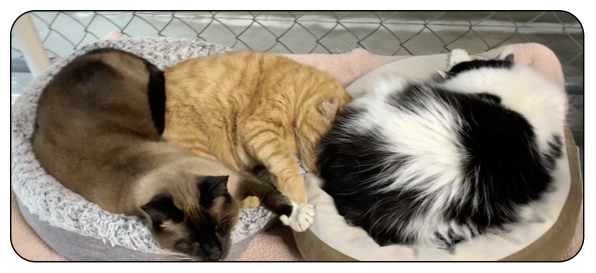Do Cats Get Lonely? Would Another Cat Help?
There's an accepted theory out there - backed up by lots of cat-parent data - that cats are independent animals who prefer to be alone. That may be because the African wild cats our modern cats are descended from were lone hunters in the wild. But, does all that still apply in modern times when cats are now pets? Do they prefer to be alone or do cats now need each other?
Today's domestic cats are not the solitary hunters they used to be. Scientific studies have shown that modern cats have adapted and now enjoy companionship and love from humans that goes beyond humans giving them safe and comfortable living situations and giving them a steady supply of food and water. All these things combined have given our cats a new focus and structure to their lives - the routine we all know they love. It's also allowed them to be more flexible in their social structures so that its possible for some cats to form very tight bonds with other cats.
Because a cat's human is the most important bond they have, when their person is away, they can get lonely. One theory suggests that it's ok to leave a cat alone for a work day or as long as 24 hours. Just be sure food and water and a clean litter box will be available during that time. Since their person won't be home to play with the cat during that time, leaving out some fun toys you know they love will help them keep from being bored or lonely. If a cat's human is going to be away longer than 24 hours at a time (whether it's a long weekend or a longer vacation), it's time for a pet sitter. Without human interaction over a long period of time, cats will become lonely and might display some behaviors that are not normal for them. It's also important to note that kittens should not be left alone longer than 4-6 hours if they are under six months old.
So, would a cat do better with a kitty companion at home? If you're away often and think your cat does get lonesome, should you get another cat? Here is a list of things to consider, from England's bluecross.org/uk:
- How does your existing cat get on with others in the neighborhood? If your cat doesn’t like other cats coming into their space and they become anxious or aggressive when this happens, this could be a sign that they wouldn’t accept sharing their home with another cat. Some breeds are best suited to being only-cats, such as Bengals.
- Neutered cats tend to get along much better than those which are not neutered because of the lack of hormones
- Related cats get on better than cats from outside the family line
- Cats can suffer from stress, so if your existing cat is unwell it’s not the best time to get a new one
- Younger cats are more likely to accepts new feline members of the household than older pusses
- Is your home of a size that can allow each cat their own space where they can get away from other cats in the home if they wish?
In thinking about all these factors, knowing your cat's personality will be critical to how you proceed. One addition to the above list for consideration should be bonded pairs of cats, who may not be related but who have bonded either in a previous home or other circumstances. It's also good to remember that multiple cats in one home means more exercise and mental stimulation for all the cats whether their human is home or not.
It turns out that, just like people, personality is what determines whether or not a cat wants feline company in its home. A good pet parent will know a cat's preferences, behaviors and routine and how those things might benefit from the addition of another cat for company. Bringing another cat into the home should never be done on a whim or without thinking hard about the cat or cats who already live there.
CLICK HERE for information on single cat vs multiple cats.
CLICK HERE for some tips on making sure your single cat is ok while you're away.
CLICK HERE for the whole article from bluecross.org/uk



Very informative site, i must bookmark it, keep posting interesting articles...
ReplyDeletedry kibble